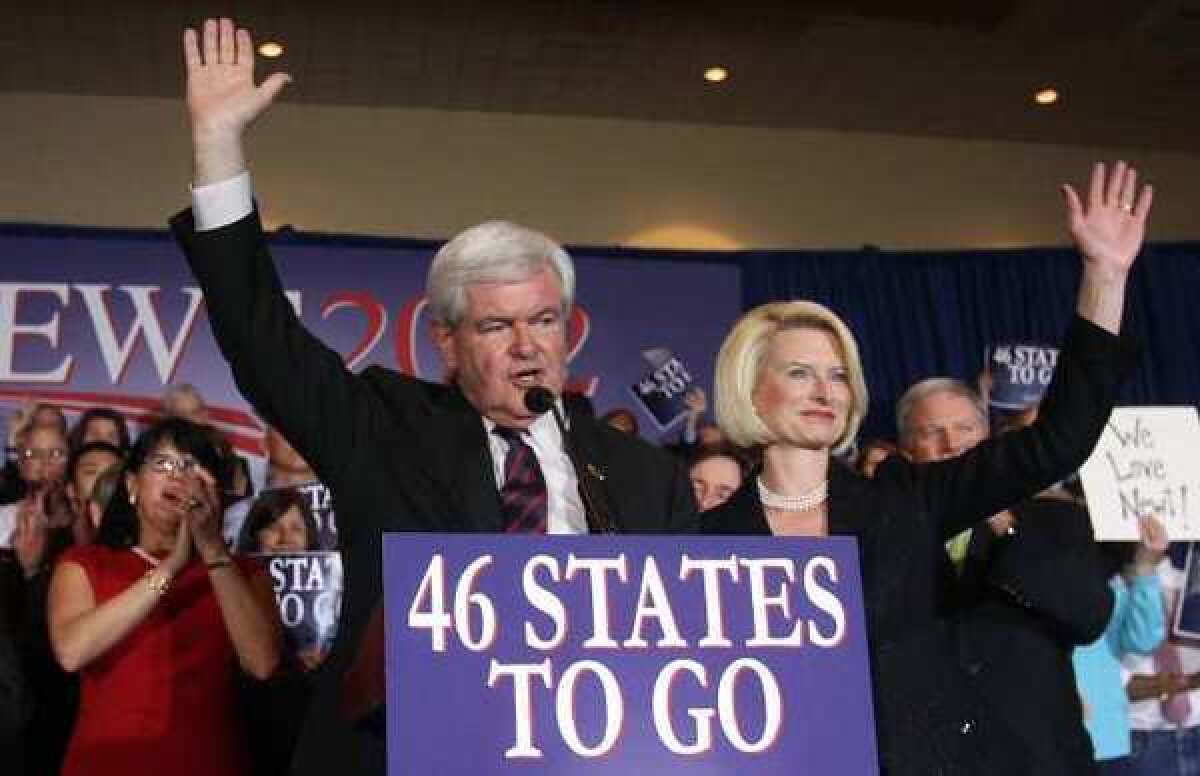McManus: The Gingrich playbook

Newt Gingrich says he’s staying in the Republican presidential race all the way to the GOP convention in August, and that he’s willing — even eager — to fight for the nomination on the convention floor. But does he have a chance?
Gingrich and his aides seem to think so, and they have a theory of how they can wrest the nomination from Mitt Romney.
It begins with pushing Rick Santorum to the sideline and uniting the party’s conservative majority behind Gingrich. That’s why Gingrich claimed a victory in having turned the campaign into a two-man race in Florida on Tuesday night instead of conceding defeat.
Next, Gingrich needs to win some additional caucuses and primaries — the Minnesota caucus on Feb. 7, for example, and several of the seven primaries on Super Tuesday, March 6.
And even if all that broke Gingrich’s way, he might still have to battle Romney for the nomination on the convention floor, an exotic scenario that Gingrich has embraced and says is part of his battle plan.
“It’s very likely that at the convention there will be a non-Romney majority [of delegates], and maybe a very substantial one,” Gingrich told reporters this week. “My job is to convert that into a Gingrich majority.”
But even for a candidate who prides himself on thinking outside the box, the idea of a wide-open convention takes some imagination.
No major party has needed more than one ballot to choose a nominee since 1952, when the Democrats selected Adlai Stevenson. The 1976 Republican convention came close because neither President Gerald R. Ford nor challenger Ronald Reagan had a majority on opening night — but Ford still managed to win on the first ballot.
Gingrich and his aides point to several reasons their plan might work. One, as Gingrich noted, is that even though Romney is the front-runner, he still hasn’t cracked 50% in a primary yet; most Republican voters would still prefer someone else. In exit polls in Florida, almost 4 out of 10 Republican voters said they weren’t happy with their range of choices — and those were the ones who showed up at the polls.
Conservatives, the core of the party, are especially dissatisfied. In the Florida exit poll, Romney won 41% of self-described conservatives; Gingrich and Santorum combined won 53%.
The rules of this year’s contest are a factor too. The Republican National Committee has decreed that primaries held before April 1 must allocate delegates among the candidates through proportional representation, not the old winner-take-all system. Florida didn’t abide by that, but if the rule holds, it will make it harder for Romney or any other front-runner to wrap up the nomination early.
“The shortage of ‘winner take all’ contests ensures that no single race will either clinch the nomination for a candidate or knock the candidate out of the race,” Gingrich strategist Martin Baker wrote in a memo distributed to reporters Monday. “This race is just getting started.”
A leading scholar of the delegate selection process, Josh Putnam of Davidson College, says that though he considers it unlikely, the Gingrich scenario isn’t impossible. “The more candidates remain in the race and remain viable,” he said, “the more difficult it would be for any candidate to surpass 50%” in the delegate count.
But there are also weak points in the Gingrich strategy.
For one, conservatives haven’t yet united behind the former House speaker — despite a television appeal from former Alaska Gov. Sarah Palin to “vote for Newt.... If for no other reason, to rage against the machine.”
Polls in Florida and other states suggest that conservative voters who currently support Santorum would divide fairly evenly between Gingrich and Romney if they were forced to opt for a second choice.
And as much as Gingrich would like to declare Santorum out of the picture, the former Pennsylvania senator hasn’t dropped out yet. Surveys released this week by Public Policy Polling, a Republican firm, showed Santorum leading in the nonbinding Missouri primary (Gingrich isn’t on the ballot) and close behind Romney and Gingrich in Ohio.
Paradoxically, while Santorum’s persistence makes it harder for Gingrich to win, it also makes an open, “non-majority” convention more likely — because it also makes it harder for Romney to amass a majority early.
“Santorum’s presence in the race does potentially help Gingrich if his goal is to prevent a Romney nomination by creating a non-majority convention,” Putnam said. “That’s still a huge long shot, though.”
Even in a system with fewer winner-take-all primaries, he noted, a front-runner such as Romney still has the advantage.
“The Democrats have had completely proportional allocation since the 1980s,” he noted. “[They] have had some trouble wrapping nominations up, but none have gone to the conventions.”
Here’s one more paradox: Even if Gingrich succeeds in preventing Romney from winning a majority of delegates before the convention, that wouldn’t guarantee Gingrich the nomination.
Romney and every other candidate will have months to woo delegates before they arrive in Tampa. And once the convention begins, there’s no reason to expect Santorum or Ron Paul delegates would embrace Gingrich as their next-best choice.
So political junkies and journalists can dream all they want about the drama that an open convention would provide. It’s just not likely to happen. And even if it did, it might well result in a thundering anticlimax: the long-expected nomination of Mitt Romney.
More to Read
Get the L.A. Times Politics newsletter
Deeply reported insights into legislation, politics and policy from Sacramento, Washington and beyond. In your inbox three times per week.
You may occasionally receive promotional content from the Los Angeles Times.







